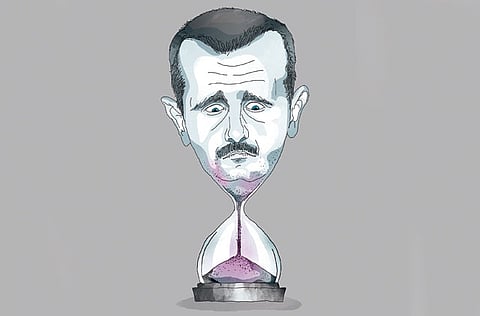Time is fast running out for Al Assad government
Though Syria's embattled president seems bent on self-destruction, he should be offered a sensible exit

In the past fortnight, Bashar Al Assad's regime has become both lonelier and bloodier. As the isolation of the Syrian president and his country have become more stark, you would think that he would become keener to negotiate his way out of his murderous impasse.
Yet he seems to be doing the precise opposite. After the Arab League's offer to mediate, his security forces have sharply increased their rate of killing.
Rather than engage seriously with the democratic opposition, Al Assad seems ever more determined to crush it. As a result, the League took the dramatic step, on November 12, of suspending Syria from membership. Unless Al Assad changes course, he risks ending up like Muammar Gaddafi in Libya. Yet even at this late hour it is still worth trying to make him see sense.
As peaceful protests against Al Assad's regime gathered steam, he had reckoned that Syria's pivotal place in the Arab world would dissuade his fellow Arabs, as well as Turks and Iranians, from turning against him. Instead the pace at which he is running out of friends seems to be quickening. Turkey, his biggest neighbour to the north, and the region's emerging power, has abandoned hope that he can reform his country or save his regime.
Support ebbs
Turkey now plays host to Syria's political opposition. The king of Jordan, to the south, hitherto cautiously neutral, has bluntly told Al Assad to go. Most of Al Assad's counterparts in the Gulf, after initially hedging their bets, are now spurning him. Iraq's Shiite-led government, which used to fear the prospect of a Sunni regime displacing Al Assad and his Alawites, has become chillier. Even Iran, his strongest local backer, betrays doubts over whether to stick with him for ever.
Just as worrying for Al Assad, China and Russia, which have blocked a blanket imposition of sanctions against Syria in the UN Security Council, may be forced to reconsider their stand. China is edging away from wholehearted diplomatic support and even Russia now thinks it prudent to hobnob with the leader of Syria's main opposition front. The international tide is plainly turning against Al Assad.
Even at this late stage, it is to be hoped that all-out civil and sectarian war can be avoided. Though a large majority of his compatriots surely hate Al Assad's gangster regime which his father established over 40 years ago, a substantial minority may still back him. The Alawites and Christians that each make up a tenth of the populace are especially nervous about change.
In Homs, Syria's third city, sectarian strife has taken an ugly turn. If the country were to fall into chaos, the suffering would be grievous and could spill across borders. On paper, Al Assad accepted the Arab League's sensible if optimistic plan to bring the fighting to an end.
Under its terms he should have withdrawn his forces from the towns, freed political prisoners (estimated by human-rights groups at between 10,000 and 20,000), let in foreign journalists and a legion of Arab League diplomats and observers, and undertaken talks with the opposition, eventually leading to multiparty elections. In fact Al Assad let out a few hundred prisoners but ignored the other recommendations.
Last chance
For sure, if his army had withdrawn from the cities, Syria would probably have been enveloped in vast rallies that might have swept away his regime. Al Assad avoided that outcome by intensifying the repression and, in an act of crass stupidity, allowed his thugs to attack the diplomatic missions of Jordan, Qatar, Saudi Arabia and Turkey, whose governments had had the temerity to criticise him.
Even so, the Arab League plan is still on the table and on November 16 the league threatened sanctions if Al Assad did not co-operate within three days. So he has a last chance.
Western governments, while squeezing Al Assad with economic sanctions and seeking to widen and tighten them via the UN Security Council, should encourage the League, rejuvenated by the Arab awakening. If the conflict in Syria descends into a bloodbath, the League may eventually invoke still more robust measures, as it did towards Gaddafi's Libya. It is much harder to intervene in Syria than in Libya.
Members of its opposition are unwisely calling for western intervention immediately. It would be much better if Al Assad were eased out by his compatriots and by fellow Arabs in the region. If he refuses to heed them, a worse fate may befall him.


